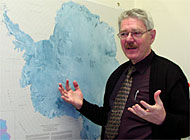Antarctic research reveals climate secrets

Half a million years of climate history are coming to light, thanks to a European project involving Swiss scientists in Antarctica.
As the team drills 3.3 kilometres through the ice surface to bedrock, the ice cores they extract are revealing a wealth of information about the climate and the composition of the atmosphere. They have currently drilled down 2.5 kilometres.
“These ice cores are a magnificent record of climate history because these ice sheets are built up by the snowfalls every year,” says the Swiss representative of the EPICA project, Bernhard Stauffer from the climate and environmental physics department of Bern University.
“The snow is compacted to ice and when we drill in the centre of an ice sheet, we have a continuous record of the snowfalls of the last 500,000 years.”
History of temperature
The European Project for Ice Coring in Antarctica or EPICA is a multinational programme aimed at improving understanding of global climate change in the polar regions.
Four Swiss researchers from Bern University are among the 22-strong team at Dome Concordia, which lies high on the central plateau of East Antarctica.
Drilling deep into the ice and extracting ice cores gives scientists an unparalleled history of temperature, together with the fluctuating levels of the greenhouse gases, methane and carbon dioxide, in the atmosphere.
One discovery so far has been the close correlation in the past between climate and greenhouse gas concentrations.
“We discovered that there was a natural big change of the atmospheric carbon dioxide concentration at the end of the last Ice Age,” said Stauffer. “Nobody would have assumed that the CO2 concentration was lower during the last Ice Age if it hadn’t been for the ice cores.
“I’m not saying that CO2 concentration increase was the reason for the warming but it was a very important amplification factor. That we had a temperature increase of five degrees was to a great part the responsibility of the increasing greenhouse gases.”
Lack of knowledge
Earlier this week, scientists from the United States announced that although global warming may be heating the rest of the planet, much of Antarctica is cooling.
“It is ridiculous that we still know so little still about the big mechanisms which govern global climate,” said Stauffer.
Belgium, Denmark, France, Germany, Great Britain, Italy, Netherlands, Norway, Sweden, and Switzerland are the ten countries involved in the EPICA project.
This week has seen the start of a second deep drilling site at Kohnen station at the other end of the continent. The new site will also help identify changes in past climate and in atmospheric chemistry.
by Vincent Landon

In compliance with the JTI standards
More: SWI swissinfo.ch certified by the Journalism Trust Initiative
You can find an overview of ongoing debates with our journalists here. Please join us!
If you want to start a conversation about a topic raised in this article or want to report factual errors, email us at english@swissinfo.ch.